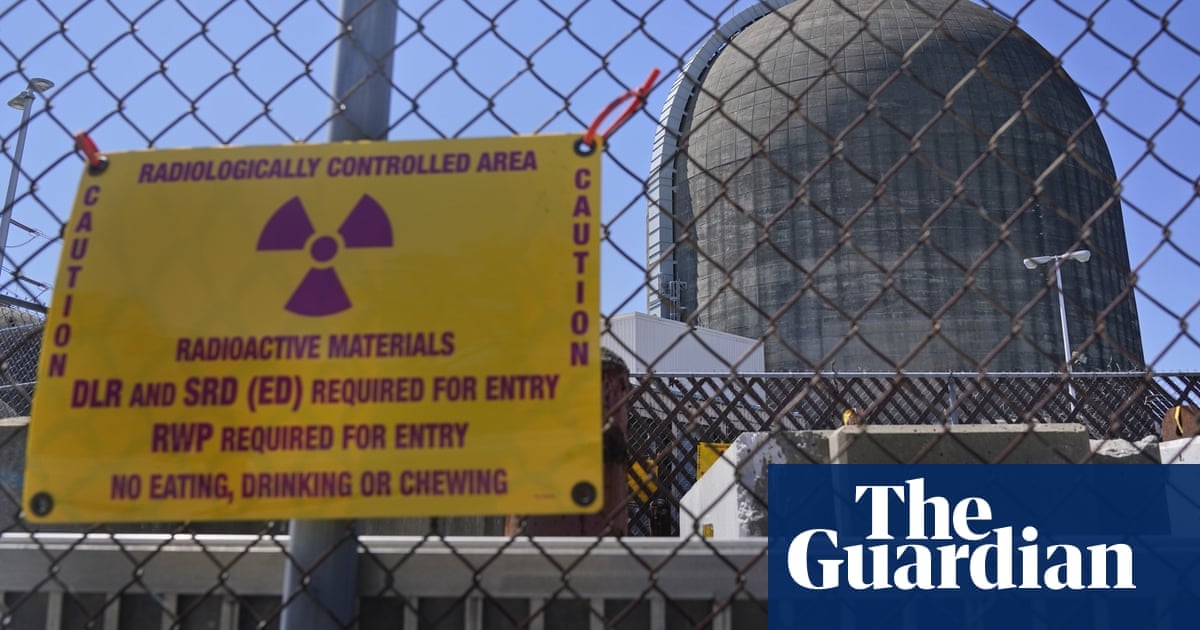Shuttering of New York facility raises awkward climate crisis questions as gas – not renewables – fills gap in power generation
When New York’s deteriorating and unloved Indian Point nuclear plant finally shuttered in 2021, its demise was met with delight from environmentalists who had long demanded it be scrapped.
But there has been a sting in the tail – since the closure, New York’s greenhouse gas emissions have gone up.
Castigated for its impact upon the surrounding environment and feared for its potential to unleash disaster close to the heart of New York City, Indian Point nevertheless supplied a large chunk of the state’s carbon-free electricity.
Since the plant’s closure, it has been gas, rather then clean energy such as solar and wind, that has filled the void, leaving New York City in the embarrassing situation of seeing its planet-heating emissions jump in recent years to the point its power grid is now dirtier than Texas’s, as well as the US average.



I’m pro nuclear based on the science, but I’m anti nuclear based on humanity. Nuclear absolutely can be run safely, but as soon as there’s a for profit motive, corporations will try to maximize profits by cutting corners. As long as there’s that conflict I don’t blame people for being afraid.
This comes off as you’re anti nuclear but you know you can’t say that, so you do the trick where you say you’re pro butttt.
“Afraid” after seeing unfettered capitalism cut corners in every way it can, with zero regard for human life.
I am not sure it’s fear so much as it is a logical response to the current situation to not want more nuclear in this context when renewables are so much cheaper.
I am not “afraid” of nuclear power, I just think it’s a really bad option right now and that its risks, like all other forms of power generation, need to be considered carefully, not dismissed out of hand.
Being afraid of what can go wrong is still being afraid. It’s not an insult.
Being afraid does not mean it’s irrational or unjustified.
It’s risks are pretty minimal, in the grand scheme. I won’t say non-existent of course. The possibility of a release is always there, but the impact is going to be measured in negative public perception, not deaths. One of the reasons the plants cost so much to build is because they have to stick a real big concrete dome over the dangerous bit.
Except that modern nuclear technologies like LFTR are objectively way safer, and even with 60s technology and unsafe operation, nuclear has fewer deaths per MWh than just about every other form of energy generation. It’s just that nuclear’s failures are more concentrated and visible.
Oh absolutely the corporations are going to want to maximize profit. There are just a lot of things they can’t get out of, especially when it comes to safety.
The nuclear industry (in the US) since TMI has had a heavy amount of oversight from its regulatory body. That the plants pay for, too, which is good.
And let’s not forget that every reactor type was “very safe” at the time. It’s true, every power plant can have problems and fail, but if a nuclear one does, consequences could be WAY worse.
First off, RBMK (Chernobyl) wasn’t safe as designed. In the US, the style of reactor wouldn’t have made it through the required licensing.
Second of all, the consequences being way worse is an exaggeration. If a nuclear power plant has a small release, the (real, scientific) impact would be minimal. If it has a large release then something else happened and the reactor containment was destroyed and whatever massive natural disaster did that is causing waaaaayy more problems. We’re probably all dead anyway.
People are afraid of radiation because you can’t see or smell or hear it. Which is probably a good thing considering you are surrounded by it all the time.
Someone recently said to me that if people had been introduced to electricity by watching someone die in an electric chair, they’d refuse to have power in their homes. People were introduced to radiation by an atomic bomb.
People: “I’m going to enjoy this sunny day with my shirt off and no sunscreen”
Same people: “I don’t want a nuclear plant anywhere in my country.”
Also fun are the 5G haters who don’t realize that 5G is being delivered over 3.4 ghz to 4.2 ghz but they’re ok with the wireless home phones doing 2.4ghz. Also fun fact for those who don’t know but you can actually destroy cellular tissue with ultrasound if the amplitude is high enough. Of course the range for this is very short and ultrasonic imagers don’t have the power to do this but ultimately this can be summarized as “everything is dangerous if you use enough of it” which just seems obvious and shouldn’t need to be mentioned.